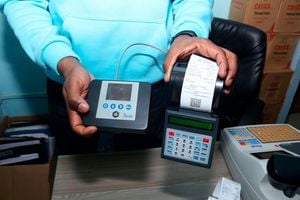
KRA Commissioner General, Humphrey Wattanga. FILE PHOTO | DENNIS ONSONGO | NMG
The Kenya Revenue Authority (KRA) is rolling out a new plan to get kiosk owners and small-scale suppliers to file electronic invoices after the taxman’s attempt to rope a critical mass of micro, small and medium-sized enterprises (MSMEs) into the tax dragnet through the electronic tax invoice management system (eTIMS) flopped.
The new system known as buyer-initiated and reverse invoicing will allow small businesses experiencing challenges with filing invoices to ask buyers of their products and services to generate the invoices on their behalf, which would partly shift the invoice burden to the more established corporate firms and entities.
By March 31, 2024, which was the deadline for mandatory migration to eTIMS, only 202,291 businesses had come on board against a target of 915,000.
This left the taxman with a 22.1 percent performance rate and sent it back to the drawing board to find new strategies for reaching businesses that predominantly operated in the hard-to-tax segment of the economy.
Of the 202,291 businesses onboarded via eTIMS, 38,000 did so via the simplified versions of eTIMS lite and the USSD code which were rolled out by the KRA in early March as part of efforts to ramp up uptake of eTIMS by players in the country’s informal economy.
Kenya has more than 7.5 million small and medium-sized enterprises, a majority of whom have evaded the tax dragnet for years.
With a budget deficit of Sh785 billion this year, President William Ruto’s administration has been implementing a raft of tax measures to bridge the revenue gap.
This has seen the taxman train its guns on the small businesses, which employ the bulk of the population.
In an attempt to catch elusive small businesses, the KRA has now turned to reverse invoicing and buyer-initiated invoices.
Reverse invoicing means micro and small businesses that supply medium and large businesses that wish to claim the expenses incurred as deductible will have the option of having the medium and large businesses raise invoices on their behalf with a mechanism to have them verify the invoices raised.
“We have been talking about the reverse invoicing solution and what this means is that entities that are incapacitated in one way or another are supported in the raising of eTIMS invoices. It is a solution we are thinking about on a case-by-case basis like we are doing with the coffee sector because there are some sectors that have started the work towards this,” KRA’s chief manager in charge of eTIMS, Hakamba Wangwe, said in an interview.
In the coffee sector, the KRA says it has partnered with stakeholders and integrated its systems with the automated coffee auction platform to be able to enforce compliance with eTIMS.
The authority says it has been able to trace coffee transactions going back to January 1, 2024, the date when Finance Act 2023 provided that only eTIMS-generated invoices would be allowed for income tax deduction purposes.
Whereas reverse invoicing is designed to target sectors that deal largely through aggregation such as coffee, tea, and dairy, the KRA is also designing a parallel system known as buyer-initiated invoicing, which will target those that operate in sectors that may not be aggregated.
The wholesale and retail sector is primed to be the main target for the buyer-initiated invoicing model.
“Buyer-initiated invoicing is a bit different and is still subject to development. How it is looking is that if I am supplying to an entity like a retail outlet and I wouldn’t like to be generating the invoices, I will actually come into the system and say that the retail outlet will be raising invoices on my behalf. Any time I make a supply, the retail entity will have credentials to log in, submit the invoice and I see the record and approve,” Ms Wangwe said.
The Finance Act 2023 amended Section 23 of the Tax Procedures Act, making it mandatory for all businesses to issue eTIMS-generated invoices as part of the government’s efforts to put the perennially hard-to-tax sectors on KRA’s radar.
The Act also amended Section 16 of the Income Tax Act to provide that effective January 1, 2024, only eTIMS-generated invoices would be deemed eligible for making claims when computing one’s tax liability.









